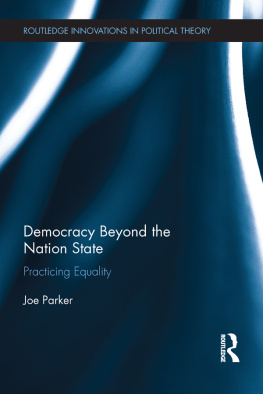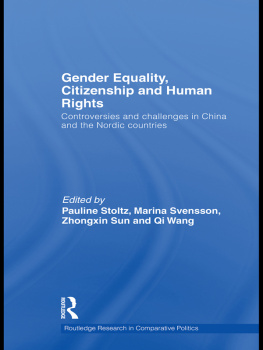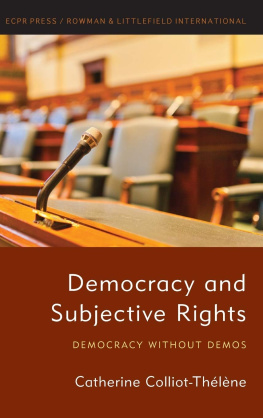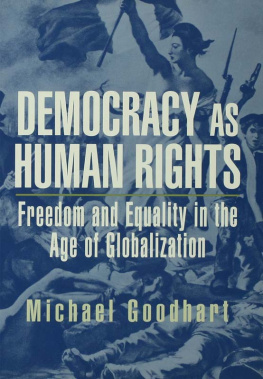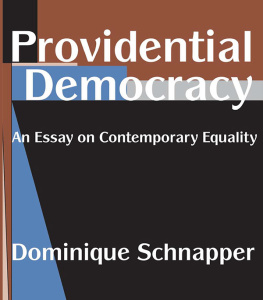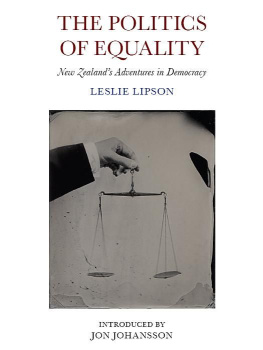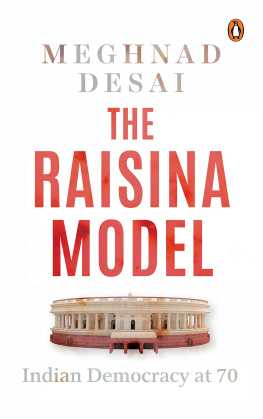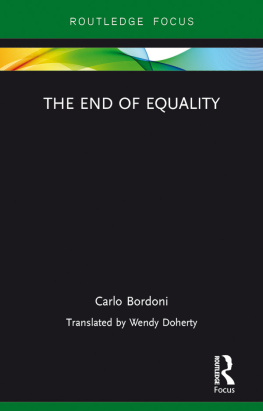With the nation state, and hence democracy as we have known it, in deep and multiple crises, the renewal of democracy on the foundation of equality depends on being attentive to the emergence of democratic and egalitarian self-government independent ofand sometimes up againstthe nation state. Joe Parker's attentive study of indigenous practices, popular democracies, and a variety of forms of everyday democracy provides us with an invaluable resource for envisagingand implementingegalitarian strategies for democratic practice beyond the nation state. Essential reading for anyone working to create new politics from the left!
Hilary Wainwright, author of Reclaim the State, Experiments in Popular Democracy, co-editor of Red Pepper, fellow of the Transnational Institute
This important book shows how practicing equality is essential to any substantive account of democracy. Through a series of examples of global and local solidarity, participation, and assembly, Joe Parker demonstrates how equality can, and does, achieve concrete meaning in the practices of community. Defying the debates that assume that principles and practices are distinct, Parker insists that equality is found in a number of practices that materialize and transform principles. Shifting our attention away from abstraction and toward popular and enacted forms of democracy, this crucial book considers how groups constitute and distribute power in an effort to produce democratic forms of life with equality at its center. With cogent analyses of groups such the Zapatista Movement, those engaged in indigenous activism, resistance movements in Burma and India, the International Women's Assembly, and Global Slum Dwellers, Parker gives us a vital history that furthers the ethical domain of democratic co-habitation that crosses the division between local and global. An inspired and inspiring read and an opening toward the future of democracy.
Judith Butler, UC Berkeley
Democracy Beyond the Nation State is a collection of synoptic surveys of contemporary communities of participatory democracy in which the participants treat each other as equals from around the world and the authors careful reflections on them. It makes a very important contribution to the growing field of local/global self-organising and self-governing associations of egalitarian democratic practice beyond the dominant representative model of democracy.
James Tully, contributor to On Global Citizenship (Bloomsbury 2014) and Freedom and Democracy in an Imperial Context (Routledge 2014)
Democracy Beyond the Nation State
Democracy promises rule by all, not by the few. Yet, electoral democracies limit decision-making to representatives and have always had a weakness for inequality. How might democracy serve all rather than the few?
Democracy Beyond the Nation State examines communities that practice equality without elites or centralized structures through assemblies and consensus. Rather than claiming equality by abstract rights or citizenship, these groups put equality into practice by reducing wealth and health divides or landlessness or homelessness and by equalizing workloads. These practices are found in rural India and Brazil, in Buenos Aires, London, and New York, and among the Iroquois, the Zapatistas, and the global networks of La Via Campesina farmers and the World Social Forum.
Readable accounts of these horizontal democracies document multiple political frames that prevent democracy from being frozen into entrenched electoral systems producing modern inequalities. Using practice to rewrite political theory, Parker draws on collective politics in Spivak and Derrida and embodied relations from Povinelli and Foucault to show that equal relations are not a utopian dream, not nostalgia, and not impossible.
This book provides many practical solutions to inequality. It will be useful to students and scholars of political theory and social movements and to those who are willing to work together for equality.
Joe Parker is Professor of International and Intercultural Studies at Pitzer College and blogs at democracies2come.blogspot.com.
Routledge Innovations in Political Theory
Time, Memory, and the Politics of Contingency
Smita A. Rahman
Michael A. Weinstein
Action, Contemplation, Vitalism
Edited by Robert L. Oprisko and Diane Rubenstein
Deep Cosmopolis
Rethinking World Politics and Globalisation
Edited by Adam K. Webb
Political Philosophy, Empathy and Political Justice
Matt Edge
The Politics of Economic Life
Martin Beckstein
The Temporality of Political Obligation
Justin C. Mueller
Epistemic Liberalism
A Defence
Adam James Tebble
Hegel, Marx, and 21st Century Social Movements
Democracy, Dialectics, and Difference
Brian Lovato
Ideologies of Experience
Trauma, Failure, and the Abandonment of the Self
Matthew H. Bowker
Post-Politics in Context
Ali Rza Takale
Claus Offe and the Critical Theory of the Capitalist StateJens Borchert and Stephan Lessenich
Equality Renewed
Christine Sypnowich
Rethinking Utopia: Place, Power, Affect
David M. Bell
Hugo Grotius and the Modern Theology of Freedom
Jeremy Seth Geddert
Critical Urban Theory, Common Property, and the Political
Desire and Drive in the City
Dan Webb
Democracy Beyond the Nation State
Practicing Equality
Joe Parker
Democracy Beyond the
Nation State
Practicing Equality
Joe Parker
First published 2017
by Routledge
711 Third Avenue, New York, NY 10017
and by Routledge
2 Park Square, Milton Park, Abingdon, Oxon OX14 4RN
Routledge is an imprint of the Taylor & Francis Group, an informa business
2017 Taylor & Francis
The right of Joe Parker to be identified as author of this work has been asserted by him in accordance with sections 77 and 78 of the Copyright, Designs and Patents Act 1988.
All rights reserved. No part of this book may be reprinted or reproduced or utilized in any form or by any electronic, mechanical, or other means, now known or hereafter invented, including photocopying and recording, or in any information storage or retrieval system, without permission in writing from the publishers.
Trademark notice: Product or corporate names may be trademarks or registered trademarks, and are used only for identification and explanation without intent to infringe.
Library of Congress Cataloging in Publication Data
A catalog record for this book has been requested
ISBN: 978-1-138-23584-7 (hbk)
ISBN: 978-1-138-40033-7 (ebk)
Typeset in Times New Roman
by Wearset Ltd, Boldon, Tyne and Wear
For the Subaltern, from Whom We Have Much to Learn, and for Tom Parker
Contents
PART I
Rethinking Democratic Practice
PART II
Specific Sites for Practicing Equality
PART III
Concrete Outcomes of Equality in Practice
Here you will find two parallel arguments, one in the text and one in the references. But, as is often the case, while starting with two, you will find that there are many more: multiple ways to practice equality beyond the modern nation state, numbering some twenty or so by some calculations, or more if you read between the lines. Each demonstrates that democracy is not all it claims to be, or that equality is more or less than it says it is, or that there are practices that exceed what we mean by democracy or equality, whoever we are.

